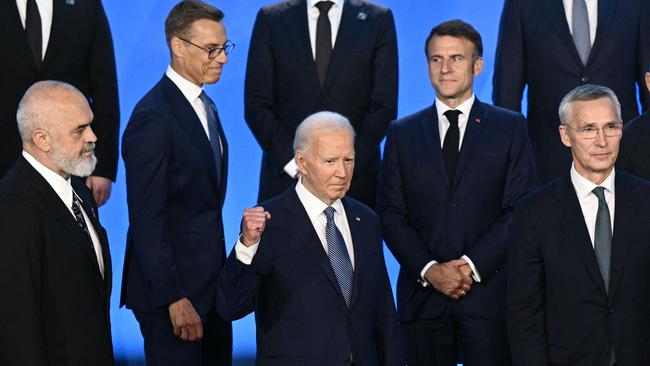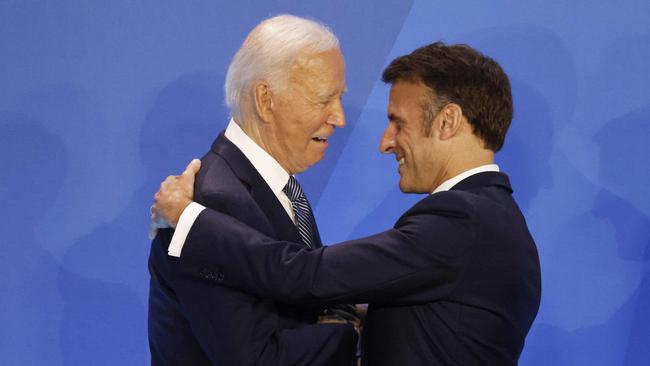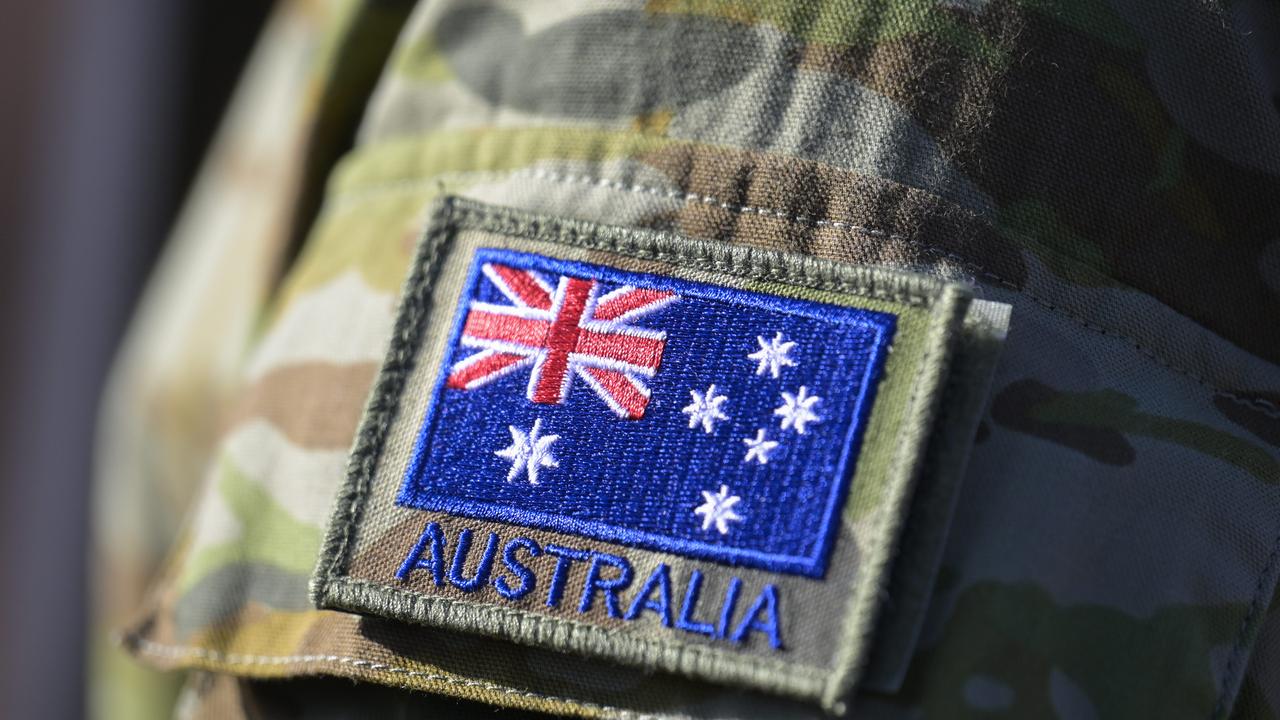Joe Biden’s leadership crisis and where to next
Joe Biden’s performance at the NATO summit has been under a fierce microscope, especially following his Putin gaffe. See what it means for his future.

World
Don't miss out on the headlines from World. Followed categories will be added to My News.
Throughout his presidency, whenever questions have been raised about his age, Joe Biden has had a simple two-word retort: “Watch me.”
When 51 million Americans did just that during his debate against Donald Trump last month, they saw the oldest president in US history showing every one of his 81 years.
But Biden’s strategy to revive his flailing election campaign has to stay the same if he is to continue as the Democratic candidate.
Somehow, he has to convince his critics that his meltdown was a one-off, not a sign of things to come. And so in a critical TV interview after the debate, the President doubled down.
“I guess a good way to judge me is you’re going to have now the NATO conference here in the United States,” he told Good Morning America anchor George Stephanopoulus.
“Come listen.”
It was an invitation not only to voters, but to the growing number of Democrats who wanted him to drop out of the race. Biden also had another audience with the leaders of America’s allies, who held similar fears about the prospective return of the former president.
The split screen between the two election candidates could hardly have been more stark on the opening night of the summit in Washington DC.

Biden took the stage in the Andrew W. Mellon Auditorium, where the NATO treaty was signed 75 years ago. He moved and spoke carefully, but with the aid of a teleprompter, he delivered a powerful message about the importance of the alliance.
“The fact that NATO remains the bulwark of global security did not happen by accident,” the President told fellow world leaders.
“It wasn’t inevitable. Again and again, at critical moments, we chose unity over disunion, progress over retreat, freedom over tyranny and hope over fear.”
Two hours later, Trump fronted a raucous rally at his Florida golf club. Diverting from his campaign stump speech, he complained that until he came to power, “we were paying almost fully for NATO”.
Trump went on to reprise his tale of how a world leader asked him if the US would protect their country under the defence treaty if they did not increase their own military spending.
“I said, ‘No, I will not protect you from Russia’,” Trump thundered.

This dichotomy is why Biden was so closely scrutinised by America’s allies this week.
Prior to his rare press conference at the end of the summit, he mostly avoided mumbling and stumbling in his brief public appearances. Damaging leaks did not immediately emerge from behind the scenes either, although while foreign leaders were diplomatic in their commentary about Biden, their officials offered more candid anonymous commentary.
“It’s a very weird feeling to be in Europe listening to the president of the United States, and you’re more stressed about whether he will go off script than being excited to listen to the leader of the free world,” a senior European diplomat told Politico.
Another added: “It doesn’t take a genius to see that the president is old … We’re not sure that, even if he wins, he can survive four years more.”
And a third official told Axios: “People are coming to witness whether Biden is or is no longer (in charge).”
Among the few heads of state willing to publicly weigh in were Finland’s president Alexander Stubb, who decried America’s “very toxic” political climate, and Poland’s prime minister Donald Tusk who declared: “They definitely have a problem.”
Australia’s Deputy Prime Minister Richard Marles side-stepped questions about Biden, only offering that he was “very pleased” with his administration’s “strong leadership”.

On the eve of the summit, a senior Biden official tried to tamp down the focus on his age and health, saying: “Foreign leaders have seen Joe Biden up close and personal for the last three years. They know who they’re dealing with, and … they know how effective he’s been.”
But other recent up-close-and-personal encounters with him had not been so reassuring. Foreign officials increasingly took note of Biden relying on a script, speaking so softly he could sometimes barely be heard, skipping ceremonial dinners, and even leaving early.
At the G7 summit in Italy – part of the busy travel schedule the President later blamed for his shaky debate performance against Trump – foreign officials told The New York Times he sometimes seemed “out of it” and they were “shocked” at his decline.
Foreign leaders reportedly discussed it among themselves, deliberately walking slowly with him and physically closing ranks if he did not appear poised in front of the cameras.

At the end of the NATO summit, Biden did not have anyone to protect him as he held what the White House referred to as a “big boy” press conference – his first in eight months.
The stakes rose shortly before he faced reporters, when he hosted an event to mark NATO’s support for Ukraine and introduced President Volodymyr Zelensky as “President Putin”.
And the press conference got off to a similarly rocky start, with Biden referring in his first answer to “Vice President Trump” instead of Vice President Kamala Harris.
Nevertheless, aided by several questions that focused on his foreign policy agenda, Biden was able to demonstrate some of the wisdom he has accumulated over a 50-year career.

In a sign of the defiance of the President and his allies – and their ignorance of the political peril he is facing – his answers prompted his press secretary Andrew Bates to post online: “No, Joe Biden does not have a doctorate in foreign affairs. He’s just that f***ing good.”
Biden himself happily boasted that European leaders had told him during the summit: “You gotta win – you can’t have this guy come forward, he’d be a disaster, he’d be a disaster.”
That said, however, some countries saw the summit’s outcomes – including an “irreversible” path to NATO membership for Ukraine after the war with Russia ends – as driven more by a desire to Trump-proof the alliance than Biden’s leadership. Some European foreign ministers even met with a top Trump foreign policy adviser on the sidelines of the summit.
Regardless of whether Biden, Trump or someone else entirely is victorious in four months, few foreign leaders could be more affected than Zelensky.
“Let’s be candid and frank: Everyone is waiting for November,” he said.
“The whole world is looking to November, and truly speaking, Putin awaits November too.”





